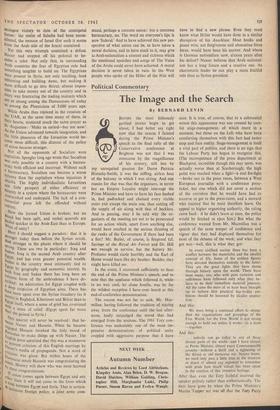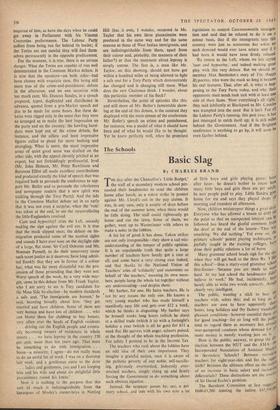Political Commentary_
The Image and the Search
By BERNARD LEVIN BEFORE the most hideously garbled stories begin to get about, I had better say right now that the reason I fainted during the Prime Minister's speech to the final rally of the Conservative conference at Brighton was not that I was overcome by the magnificence of his oratory, still less by my unrequited passion for Dame Patricia Hornsby-Smith; it was the stifling, airless heat of the balcony in which I was sitting. And one reason for that was that the organisers, in terror lest an Empire Loyalist might interrupt the Prime Minister and have to have his face bashed in, had padlocked and chained every visible outer exit except the main one, thus cutting off the supply of air along with that of hecklers. And in passing, may I be told why the or- ganisers of the meeting are not to be prosecuted for an action which, apart from anything else, would have resulted in the serious thinning of the ranks of the Government if there had been a fire? Mr. Butler, of course, is fireproof (cf. Sayings of the Royal Air Force) and Dr. Hill wet enough to survive, but the buttery Mr. Profumo would sizzle horribly and the Earl of Home would burn like dry heather. Besides, they might have killed me.
In the event, I recovered sufficiently to hear the end of the Prime Minister's speech, and to note that the applause which followed it, while in no way cool, let alone hostile, was by far the mildest reception I have ever heard at this end-of-conference demonstration.
The reason was not far to seek. Mr. Mac- millan, having followed the tradition of staying away from the conference until the last after- noon, badly misjudged the mood that had emerged from the sessions. The 1961 Tory con- ference was undeniably one .of the most im- pressive demonstrations of political unity cotipled with aggressive purpose that I have seen. It is true, of course, that to a substantial extent this appearance was one created by care- ful stage-management, of which more in a moment; but those on the Left who have been comforting themselves with this fact had better stop and face reality. Stage-management is itself a vital part of politics, and there is no sign that the Labour Party has begun to recognise this. (The incompetence of the press department at Blackpool, incredible though this may seem, was actually worse than at Scarborough; the high point was reached when a fight—a real fist-fight —broke -out in the press room, between a West European journalist with a conference press- ticket, but one which did not cover a section of the corridors that he would have had to traverse to get to the press-room, and a steward who insisted that he must therefore leave. On appeal to higher organising authority, the ruling came back : if he didn't leave at once, the police would be fetched to eject him.) But what the conference wanted from Mr. Macmillan was a speech of the same temper of confidence and vigour that they had displayed themselves for most of the debates of the week; and what they got was—well, this is what they got: In every civilised society there has been a conflict between the materialist and the idealist concept of life. Some of the noblest figures
have devoted themselves entirely to the latter. They are the great lights that have shone through history upon the world. There have been many, too, who with pure cynicism and selfishness have followed only what they be- , lieve to be their immediate material interests. All the same the mass of us have been brought up to believe that practical day-to-day am- bitions should be leavened by idealist inspira- tion.
And this:
We must bring a continual effort to streng- then the organisations and groupings of the Free World, for the Free World is not strong enough to hold out unless it works—as a team —together.
And this: . . . nobody can go today to any of those distant parts of the world—and I have visited, as Prime Minister, almost every Commonwealth country—without a thrill and a tightening of the throat as old memories stir. Nearer home, we need only pass a little time in the museum or depot of almost any regiment to remember with pride how much valour has been spent in the creation of this immense heritage.
After that, even the Tory faithful received the speaker politely rather than enthusiastically. The days have gone by when the Prime Minister's Martin Tupper act was all that the Tory Party required of him, as have the days when he could get away in Parliament with his Vincent Crummles performance. The Labour Party suffers from being too far behind its leader; if the Tories are not careful they will find them- selves permanently in the opposite predicament.
For the moment, it is true, there is no serious danger. What the Tories are capable of was well demonstrated in the Common Market debate. It is true that the speakers—on both sides—had been chosen with exquisite care, this being still more true of the crime-and-punishment debate in the afternoon, and on one occasion with too much care; Mr. Duncan Sandys, in a speech prepared, typed, duplicated and distributed in advance, quoted from a pro-Market speech not due to be made for some hours. But these de- bates were rigged only in the sense that they were so arranged as to make the best impression on the party and on the country; the howling harri- dans were kept out of the crime debate, for instance, and the silliest and least impressive figures called to plead for more bashing and strangling. What is more, the most impressive array of quiet good sense was drafted on the other side, with the appeal cleverly pitched at an expert, but not forbiddingly professorial, level (Mr. John Hobson, Mr. Peter Rawlinson and Baroness Elliot all made excellent contributions and produced exactly the kind of speech that was required both to persuade the conference to sup- port Mr. Butler and to persuade the televiewers and newspaper readers that a new spirit was stalking through the Tory Party). And the tide in the Common Market debate set in so early that it was not even a surprise, when the 'vote' was taken at the end, to see the steamrollering the little-Englanders received.
Cant and hypocrisy! cries the Left, uneasily making the sign against the evil eye.' It is true that the mask slipped once; the debate on im- migration produced some of the nastiest sights and sounds I have ever seen on the daylight side of a large, flat stone. Sir Cyril Osborne and Mr. Norman Pannell, to do their unsavoury cause such scant justice as it deserves, have long admit- ted frankly that they are in favour of a colour bar; what was far more distasteful was the pro- cession of those pretending that they were not. Worst speech of the week, by a very wide mar- gin, came in this debate from Mr. Frank Taylor, who I am sorry to see is Tory candidate for the Moss Side by-election—by modern standards a safe seat. The immigrants arc human,' he said, beaming broadly about him; 'they get married and have children. Some of them are very human and have lots of children . . . who can blame them for clubbing to buy houses, very often over the heads of English residents . . . driving out the English people and eventu- ally becoming owners of residences in whole streets . . . we have leprosy in the country 150 per cent. more than ten years ago. That must be something to do with immigration. . . . Some—a minority, I agree--do not really want to do an awful lot of work. I was on a doorstep last week, and a gentleman came to the door . . . ladies and gentlemen, you and I are keeping him and his wife and about six delightful little piccaninnies round his knees.'
Now it is nothing to the purpose that this sort of muck is indistinguishable from the harangues of Mosley's corner-boys in Notting Hill (has it ever, 1 wonder, occurred to Mr. Taylor that his own three piccaninnies were produced in the same way and for the same reasons as those of West Indian immigrants, and are indistinguishable from them, apart from their colour and, probably, the manners of their father?) or that the statement about leprosy is simply untrue. The fact is, a man like Mr. Taylor. on this showing, should not have got within a hundred miles of being allowed to fight a safe seat for a Tory Party which demonstrably has changed and is changing still more. What does the new Chairman think. I wonder, about this particular member of his flock?
Nevertheless, the point of episodes like this, and still more of Mr. Butler's lamentable show- ing at the end of this debate, is the contrast they displayed with the main stream of the conference. Mr. Butler's speech on crime and punishment, for instance, was a model of what it should have been and of what he would like to be thought. Yet he knew perfectly well, when he promised legislation to control Commonwealth immigra- tion and said that he refused to do it on 3 colour basis, that if the immigrants into this country were just as numerous but white nO such demand would ever have arisen and if it had been it would have been firmly refused.
We return to the Left, whom we lett cry Oa 'cant and hypocrisy,' and indeed making great play with this very debate. But we should re' member Max Beerbohm's story of The Hypocrite, who wore the mask so long it becanse his real features. That, after all, is what is hap' petting to the Tory Party today, and why tt elf opponents must needs look sick with at least ono side of their faces. 'Now everything's all right,' they said jubilantly at Blackpool as Mr Cousins was trampled into the sand But it isn't. For all the Labour Party's running. this past year, it 1 as just managed to catch itself up; it is still miles behind the Government. And if the Brightoll conference is anything to go by, it will soon be even farther behind.







































 Previous page
Previous page